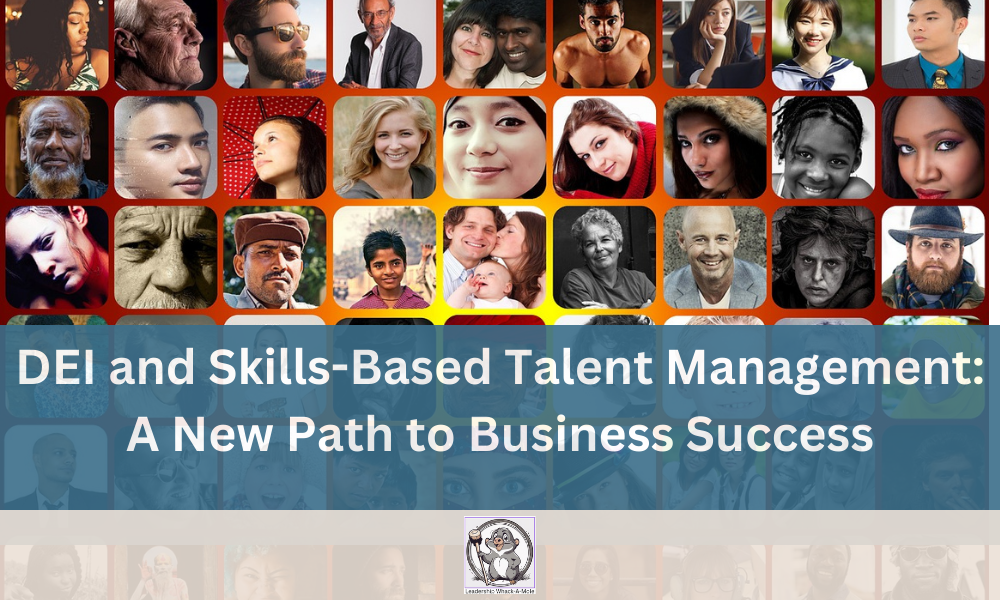
By Jeff Fierstein
In my previous post, I explored the way Diversity, Equity, and Inclusion (DEI) is often framed within political and ideological contexts, with limited attention given to its tangible impact on business outcomes. The intent of this blog is to highlight how skills-based talent management can complement principles supporting DEI, enhancing organizational performance and fostering a more inclusive workplace.
Amid growing opposition to DEI initiatives, many companies are scaling back or eliminating their programs altogether. However, there is a viable alternative. By integrating the principles of respect, inclusion, and equal opportunity with skills-based employment strategies, businesses can offer opportunities for individuals to thrive based on merit, rather than formal credentials, educational background, or demographic factors.
As discussed previously, DEI is not just about ensuring equal employment opportunities; it is also about cultivating a workplace where every employee feels valued, respected, and empowered to contribute, irrespective of race, gender, or other demographic identifiers. One way to achieve this is by creating opportunities for all workers to gain skills that enhance their employability and prospects for promotion—based on demonstrated ability, not preconceived notions of underrepresentation.
What is Skills-Based Talent Management?
Skills-based talent management is an approach that emphasizes a candidate’s specific skills, knowledge, and abilities (often referred to as competencies) rather than traditional qualifications like formal education or degrees. It influences recruitment, hiring, employee development, role assignments, and promotions by focusing on an individual’s ability to perform essential tasks, versus their race or gender. This approach ensures that employment decisions are based on skills, competencies and experience rather than on biases related to class or demographic factors.
By focusing on skill proficiency, skills-based talent management opens doors for candidates who may not have formal degrees but possess valuable on-the-job experience, training, certifications, apprenticeships, or self-acquired skills. This approach creates opportunities for underrepresented groups to advance in the workplace, as organizations offer the resources needed for skill acquisition and career growth.
In light of the current backlash against DEI initiatives, skills-based talent management offers a way to uphold the core values of DEI—such as equal opportunity and workplace inclusion—without relying on mandated programs or even using the term “DEI.” This strategy can continue to foster the benefits that DEI brings to the workplace while adapting to changing organizational priorities.
The Benefits of Skills-Based Talent Management
- Expanding the Talent Pool: Businesses today often struggle to find qualified candidates from a limited pool. Skills-based talent management expands the talent pool by including candidates with diverse experiences and backgrounds, giving businesses a competitive edge in talent acquisition.
- Employee Retention: Providing employees with opportunities for skills development and career growth helps improve job satisfaction and retention. With employee turnover at historically high levels, retaining talent is critical. Investing in employee development reduces the costs associated with turnover—approximately half of an employee’s salary—and redirects those funds towards employee growth instead.
- Leveling the Playing Field: Skills-based talent management offers a fairer approach to hiring and promotion, where opportunities are determined by an individual’s skills, qualifications, and experience, rather than their race, gender, or educational background. By focusing on objective criteria, it mitigates bias and promotes equity within the workplace.
- Improving Organizational Diversity: By considering a wider range of candidates, businesses can foster a more diverse and inclusive workforce. Greater diversity leads to improved innovation, decision-making, team performance, and a more comprehensive representation of customer needs.
A 2024 survey conducted by Test Gorilla of over 2,100 employees and employers (www.testgorilla.com/skills-based-hiring/state-of-skills-based-hiring-2024) revealed several key findings regarding skills-based hiring:
- 94% of respondents agreed that skills-based hiring (SBH) is a more accurate predictor of on-the-job success than resumes.
- 84% of employees believed SBH could help prevent hiring bias.
- 81% of employees said SBH gave them access to new job opportunities.
- 90% of respondents felt SBH improved diversity, 91% said it enhanced retention, 78% noted reduced hiring costs, and 90% observed a decrease in mis-hires.
Organizations Using Skills-Based Talent Management
Leading companies across various industries have already embraced skills-based talent management, including:
- IBM
- Accenture
- Walmart
- Microsoft
- Delta Airlines
- Bank of America
- Verizon
By leveraging skills-based talent management, these organizations demonstrate a commitment to building diverse, high-performing teams while aligning with evolving business needs and workforce expectations.
For more discussion of DEI and skills-based talent management, click on the banner above.
If you would like a complimentary copy of the Leader Self-Assessment of Cultural Inclusiveness and Respect, add “leader self-assessment” in the Comments field below, add your email information and click Post Comment. We’ll gladly email you your copy.




